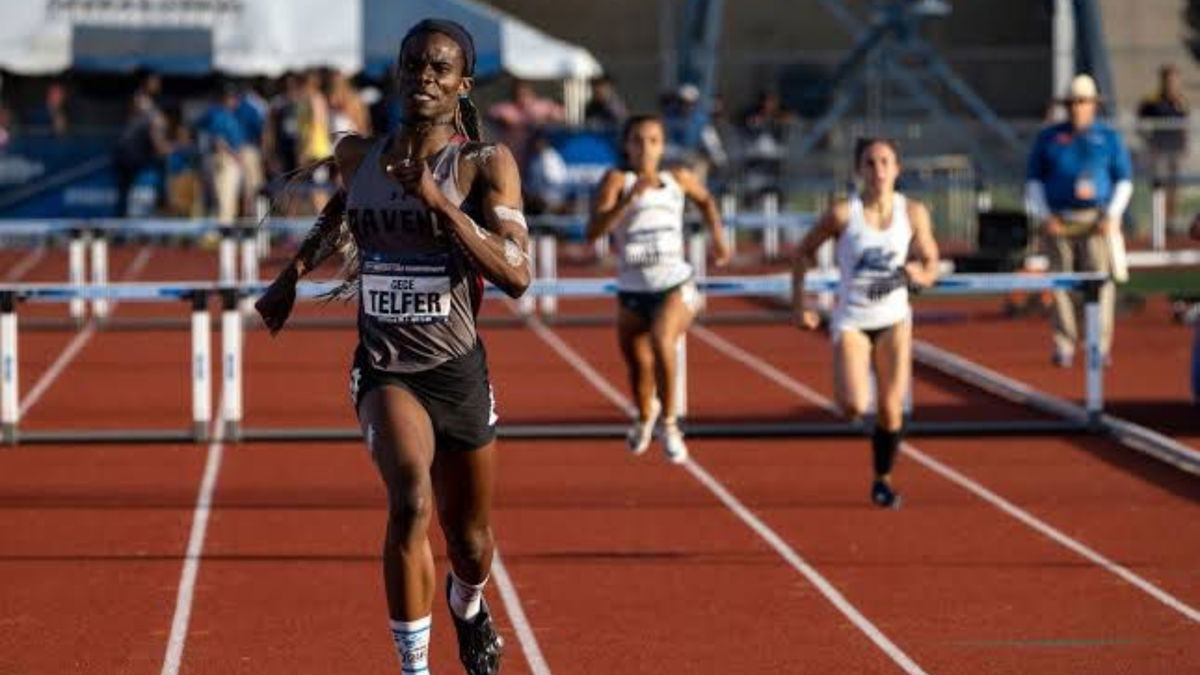

The whole debate about transgender women competing in women’s events, be it in track and field or any other sports at the Olympics or elite events, has been a huge topic for a while, and now it feels like one big decision could finally shift things. Sebastian Coe, who’s running for the International Olympic Committee (IOC) president, is making this a key part of his campaign. If he wins, he’s pushing for policies protecting women’s sports’ integrity. But here’s the question: will these “science-based” rules be clear enough to solve the issue without causing more division?
Watch What’s Trending Now!
Coe’s strategy draws from his time with World Athletics, where they’ve already restricted male-to-female transgender athletes from competing in elite women’s events, including the Olympics and NCAA. He plans to collaborate with athletes, scientists, and international federations to create guidelines. Coe’s take is pretty clear—he believes transgender women shouldn’t be allowed to compete in elite women’s sports, arguing that it’s the best way to ensure fairness and prevent any confusion around the rules. But is this the fairest solution for everyone?
The debate has only gotten more heated, especially after the Paris Olympics, where Imane Khelif’s women’s boxing gold medal raised some major concerns about gender verification. Some international federations have supported Coe’s stance, but it’s also faced criticism. Could these strict rules end up excluding some athletes who are just trying to compete? Coe seems to think that clear, science-backed policies are the way forward, but is there a middle ground? Well, now track and field fans also chimed in to share their opinions when this news circulated on Reddit.
ADVERTISEMENT
Track and field fans clash over transgender athletes in NCAA and elite sports
One fan shared their thoughts, saying, “Track and field is one of the few sports where men and women share the same venue and the same spectators. This is part of what makes the sport great.” They pointed out that there are already various divisions in the sport, such as age groups and competition levels, and suggested, “If we need to add a division for trans-athletes , let’s add a division.” The fan emphasized that the mix of different types of competitors is what makes track and field unique and exciting.
They also expressed a desire for more inclusivity, explaining, “I’m not looking for ways to exclude anyone. I am looking for ways to include more people.” The fan pointed out that, in the track, “somebody crosses the line first, but tears of joy are wept by many,” highlighting that personal achievements are what truly matter. They believe the sport can evolve, saying, “Our sport can evolve. We now run metric distances… Let’s maintain needed divisions that create great competitions, and also maintain our goal to include people.” Ultimately, they expressed a deep love for seeing everyone striving to be their best, regardless of their gender.
ADVERTISEMENT
Another fan pointed out, “There’s already one very significant exclusion present at the elite level. You need to be exceptionally athletic.” They expressed no issue with transgender athletes competing at lower levels, but when it comes to elite competition, they believe “male-to-female athletes have an unfair advantage over born-female competitors.” The fan raised concerns about the pressure transgender athletes may face regarding medical requirements, like hormones or surgery, which could force them into decisions they’re uncomfortable with. The fan suggests that the answer might be for transgender athletes to not compete in their non-birth gender at all, or possibly even not at all if they’re inters*x.
Top Stories
NFL Announces Decision on Rashee Rice Incident Amid Disturbing Allegations From Ex-GF

NFL Coach of 62 Years Retires Before Todd Bowles & Buccaneers Turn Coaching Room Upside Down With 5 Firings

Brad Keselowski Snuffs Out Retirement Rumors Despite Prolonged Winless Streak

NASCAR Rumor: Fans Left Baffled as Insider Leaks ‘New Championship Format’ Weeks Before 2026 Season

Two Years After Sydney McLaughlin-Levrone, Quincy Wilson and Co. Make History With New Balance Announcement

Commanders Release Statement on Marshon Lattimore as CB Faces Charges After Arrest

ADVERTISEMENT

They further argued that most people, even those who are dedicated, will never become competitive athletes, often due to their abilities but sometimes because of factors like gender identity or inters*x conditions. Well, CeCe Telfer, the transgender athlete who made history by winning the NCAA women’s track and field championship in 2019, has had a tough time recently. Earlier this year, World Athletics introduced new rules that stopped athletes who’ve gone through “male puberty” from competing in women’s events, which meant CeCe couldn’t compete at the international level anymore.
ADVERTISEMENT
Obviously, she was devastated at first, even more so since the said policy came into effect on March 31, the same day as Trans Day of Visibility. But CeCe isn’t backing down. She is determined and saying that the battle is not over yet, and she is heading to the indoor tracks as soon as possible with the hopes of being a record setter. Apart from the changes to the rules, CeCe has received some really hard personal tests. She planned to run in the 2021 U.S. Olympic trials but did not make it to the track as she got disqualified the following day for ineligibility.
One fan commented, “This is obvious common sense to 99% of the world, the only people who disagree are a tiny subset of ideologically possessed progressives, many of which unfortunately spend 24/7 on reddit lol.” Another person added, “I fully support this idea but transgenders are a very small minority, let alone inters*x. There aren’t enough to make for a competitive category. I do not think this is feasible.”
Someone else said, “I thought there was a ban in place for WA already unless if he wants to spread it through more sports. I’m not an expert to able to judge WA’s justification for the ban but I do believe that if anything it’s only temporary and will be lifted once whatever discrepancy between transgender women and women in athletic competitions will be mitigated through advancement of technology in the medical field.”
ADVERTISEMENT
Back in January 2022, the NCAA made some updates to its policy on transgender student-athletes to bring it in line with the Olympic movement. Now, there are specific eligibility requirements for each sport, which means transgender athletes must go through a review process. For a trans woman to compete in NCAA women’s sports, her school needs to submit two main pieces of paperwork: a Transgender Student-Athlete Eligibility Review Form and lab results showing her testosterone levels are within the acceptable range for her sport. The lab results have to be from within the last four weeks before her first competition, and if she’s a multi-sport athlete, the school has to submit these documents for each sport she competes in.
The policy also covers situations where transgender athletes might need medical exceptions, like if they’re using hormone therapy, which could involve substances banned in NCAA sports. In those cases, the school would need to submit a request for a medical exception. Once everything’s submitted, the eligibility gets reviewed by a panel of medical experts, and if an athlete isn’t eligible, they can provide updated documents for reconsideration. These changes help ensure that the eligibility process is fair, consistent, and transparent, while still allowing transgender athletes to compete under clear guidelines.
One more fan added, “World Athletics rules already apply in the Olympics. Same with World Aquatics in swimming (which I think has made 2 categories: women’s and open). I think it’s pretty standard for the sports governing body to manage their respective competitions at the Olympics. There are exceptions though, which explain the women’s boxing shit show in Paris with Imane Khelif. The IOC doesn’t recognize the international boxing association because it’s managed by the Russians or something like that.”
ADVERTISEMENT
Remember Lia Thomas, the swimmer who made history in March 2022 as the first transgender athlete to win an NCAA college title in the women’s 500-yard freestyle? That March 2022 NCAA championship marked her last college swimming event. By the end of her swimming career at UPenn, Thomas’s ranking had shifted dramatically. Thomas went from being 65th on the men’s team to 1st on the women’s team in the 500-yard freestyle and from 554th on the men’s team to 5th on the women’s team in the 200-yard freestyle. According to Swimcloud, Thomas was ranked 36th among female college swimmers in the U.S. for the 2021–2022 season and 46th nationally.

ADVERTISEMENT
But Thomas faced a significant setback. Thomas recently lost a legal case against World Aquatics, ending her hopes of competing in Paris. The ruling also upheld the 2022 rules introduced by swimming’s governing body, which prohibit anyone who has undergone male puberty from competing in the female category. Despite Thomas’ argument that these rules were unfair and violated the Olympic charter, the court decided that Thomas no longer had the right to challenge them. World Aquatics, in turn, hailed the decision as a victory for protecting women’s sports, and while they’ve introduced an “open” category for transgender swimmers, the debut of that category at the 2023 Berlin World Cup was canceled after no entries were received.
The future of track and field might be heading toward some pretty big changes. So what do you think? Will the committees figure out a way to keep the sport fair, inclusive, and still competitive? Maybe we’ll see new divisions pop up to make sure everyone has a fair shot. Or maybe we’ll see more tweaks to the existing rules. Either way, it seems like a huge moment for the sport and for sports in general. The next few years will be interesting to watch.
ADVERTISEMENT
ADVERTISEMENT
ADVERTISEMENT
ADVERTISEMENT

